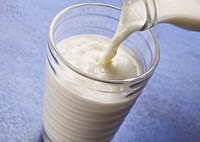The FSA Board is being asked to consider new proposals for the
sale of raw, or unpasteurised, milk. These would include exploring the
scope for wider access to raw milk, including limited sales from vending
machines in shops, and changes to hygiene controls.
The proposals are set out in a board paper published today. They
follow an extensive review of the current raw milk controls and a public
consultation launched in January.
The review found that the current controls are managing the potential risks associated with drinking raw milk. There was also strong support from existing consumers and producers for continued, wider and controlled access to raw milk.
Selling raw milk from vending machines placed in shops is currently not allowed, although they can be placed on farm premises. Subject to the FSA Board's agreement, the FSA would begin discussing with raw milk producers the practicalities of vending machine sales in shops, and any additional controls that might be required to ensure that the risks are being managed.
Steve Wearne, Head of Policy at the Food Standards Agency, said:
'Throughout this review process we have sought to balance consumer protection with consumer choice. It is clear that the current raw milk regulations have worked well to control the risks from raw milk. We are not advising that these controls should be removed completely as they are necessary for continued consumer protection. However, we believe there is the opportunity for us to make changes which balance modest liberalisation of sales with controls on production that ensure continued consumer protection.'
The proposals cover England, Wales, and Northern Ireland. Sale of raw milk is banned in Scotland.
The FSA launched a four-month consultation on the raw milk regulations in January. This included a raw milk stakeholder event held in Central London on 31st March. More than 140 people gathered to take part in the discussion and hear speakers including representatives of the FSA, raw milk producers and consumers, Dairy UK and scientists.
The review found that the current controls are managing the potential risks associated with drinking raw milk. There was also strong support from existing consumers and producers for continued, wider and controlled access to raw milk.
Selling raw milk from vending machines placed in shops is currently not allowed, although they can be placed on farm premises. Subject to the FSA Board's agreement, the FSA would begin discussing with raw milk producers the practicalities of vending machine sales in shops, and any additional controls that might be required to ensure that the risks are being managed.
Steve Wearne, Head of Policy at the Food Standards Agency, said:
'Throughout this review process we have sought to balance consumer protection with consumer choice. It is clear that the current raw milk regulations have worked well to control the risks from raw milk. We are not advising that these controls should be removed completely as they are necessary for continued consumer protection. However, we believe there is the opportunity for us to make changes which balance modest liberalisation of sales with controls on production that ensure continued consumer protection.'
The proposals cover England, Wales, and Northern Ireland. Sale of raw milk is banned in Scotland.
The FSA launched a four-month consultation on the raw milk regulations in January. This included a raw milk stakeholder event held in Central London on 31st March. More than 140 people gathered to take part in the discussion and hear speakers including representatives of the FSA, raw milk producers and consumers, Dairy UK and scientists.
